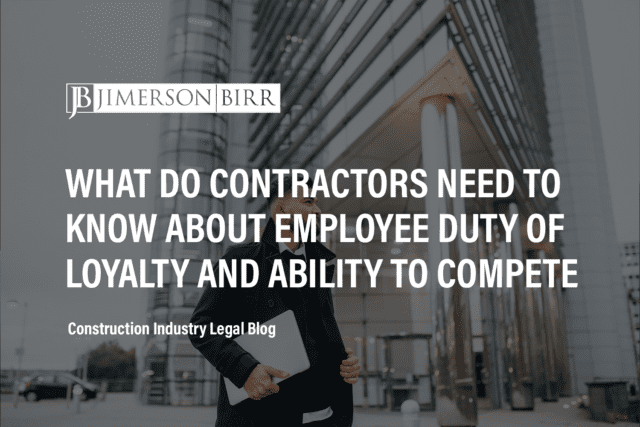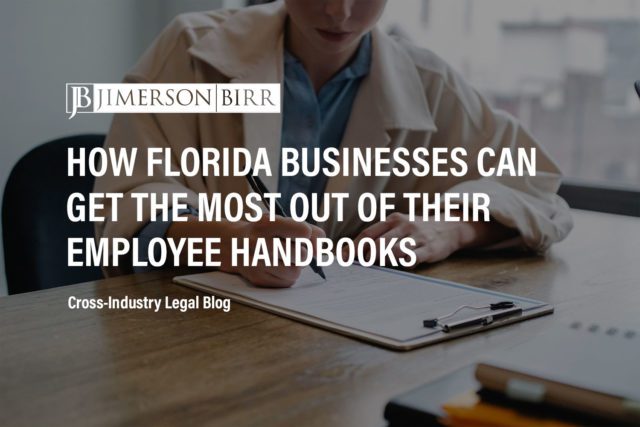What do confidentiality and non-disclosure agreements encompass?
Confidentiality and non-disclosure agreements (NDAs) are legally binding contracts designed to protect sensitive information shared between parties in various contexts, including employment relationships. In Florida, NDAs are often used to safeguard trade secrets, intellectual property, and other proprietary information from unauthorized disclosure.
A typical NDA outlines the types of information considered confidential, the responsibilities of the receiving party, and the consequences for breaching the agreement. In the context of Florida employment law, an employee may be required to sign an NDA to prevent them from sharing sensitive company information with competitors or the public.
Need help with training, compliance, or litigation to protect your workplace? Schedule your consultation today with a top employment law attorney.
Which laws, rules, and regulations apply to confidentiality and non-disclosure agreements?
The principal statute governing NDAs in Florida is the Florida Uniform Trade Secrets Act (FUTSA), codified in Chapter 688 of the Florida Statutes. FUTSA provides legal remedies for misappropriating trade secrets, including unauthorized disclosure of confidential information protected by an NDA. In addition to FUTSA, Florida case law also enforces NDAs, especially when the agreement might be considered overly broad or restrictive.
At the federal level, the Defend Trade Secrets Act (DTSA) offers protection and remedies for misappropriation of trade secrets, which may apply in situations involving NDAs. While Florida law primarily governs the interpretation and enforcement of NDAs within the state, federal law can also be relevant, mainly when interstate commerce is involved or when federal intellectual property rights are at stake.
What are common issues associated with confidentiality and non-disclosure agreements that lead to litigation against employers?
NDAs are essential tools for protecting valuable business information. However, disputes can arise, leading to litigation. Based on Florida and federal cases, statutes, codes, regulations, and secondary sources, some common issues associated with NDAs that can lead to litigation include:
- Ambiguity: Unclear or vague terms in the NDA may cause disputes, as parties may interpret the terms differently.
- Overly Broad Scope: An NDA that is overly restrictive on employees may be challenged as unreasonable and unenforceable.
- Breach of Contract: When an employee allegedly discloses confidential information, the employer may sue for damages or injunctive relief.
What are the prerequisites to file a lawsuit regarding confidentiality and non-disclosure agreements, and what legal defenses are available?
Before filing a lawsuit regarding an NDA, employers must meet particular legal prerequisites:
- Existence of a Valid NDA: The employee must prove the existence of a legally binding agreement.
- Breach of the NDA: The employee must demonstrate that the employer breached the agreement’s terms.
- Damages: Employees must show they suffered harm due to the breach.
Employees facing claims related to NDAs may assert several affirmative legal defenses, including:
- Lack of a Valid NDA: The employee may argue that the NDA is not legally binding for reasons such as lack of consideration or mutual consent.
- Statute of Limitations: The employee may assert this defense if the employer’s claim is filed after the applicable statute of limitations has expired.
- Unenforceability: The employee may claim that the NDA is unenforceable due to overly broad scope or unconscionability.
To determine whether your unique situation may necessitate litigation or another form of specialized advocacy, please contact our office to set up your initial consultation.
What measures must employers take to legally and effectively create confidentiality and non-disclosure agreements?
To legally and effectively create confidentiality and non-disclosure agreements, Florida employers must take the following measures:
- Avoid Overbreadth: NDAs must not be overly broad in scope and must be limited to the specific information that the employer seeks to protect. Florida courts will not enforce agreements that are too broad in scope or too long in duration.
- Communicate: Clearly communicate the terms of the agreement to the employee. The employer must provide the employee with a copy of the agreement and explain its terms, particularly if it is complex or contains legal jargon.
- Provide Adequate Training: Train employees on the importance of confidentiality and non-disclosure agreements. Employers must provide employees with adequate training on the importance of protecting confidential information and explain how the company’s confidential information should be treated.
- Consult, Review, and Revise: Review and update the agreement periodically. Employers should regularly review and update their NDAs to ensure they remain valid and enforceable. Maintaining a strong, consistent relationship with outside (or inside) legal counsel helps make this a regular process within any organization.
Please contact our office to set up your initial consultation to see what forms of legal advocacy or intervention may be available for your unique situation.
Frequently Asked Questions
Can NDAs be enforced against former employees?
Yes, non-disclosure agreements can be enforced against former employees if the agreement is reasonable in scope and duration and is supported by valuable consideration.
Can an employer require an employee to sign an NDA after the employee has already been hired?
Yes, an employer can require an employee to sign a non-disclosure agreement after the employee has already been hired, as long as the agreement is supported by valuable consideration and is reasonable in scope and duration.
Can an employer include a non-disclosure clause in a non-compete agreement?
Yes, an employer can include a non-disclosure clause in a non-compete agreement. However, the employer must have a legitimate business interest in enforcing the non-compete agreement, such as protecting trade secrets or confidential information.
Have more questions about employment law training, compliance, or litigation?
Crucially, this overview of confidentiality and non-disclosure agreements does not begin to cover all the laws implicated by this issue or the factors that may compel the application of such laws. Every case is unique, and the laws can produce different outcomes depending on the individual circumstances.
Jimerson Birr attorneys guide our clients to help make informed decisions while ensuring their rights are respected and protected. Our lawyers are highly trained and experienced in the nuances of the law, so they can accurately interpret statutes and case law and holistically prepare individuals or companies for their legal endeavors. Through this intense personal investment and advocacy, our lawyers will help resolve the issue’s complicated legal problems efficiently and effectively.
Having a Jimerson Birr attorney on your side means securing a team of seasoned, multi-dimensional, cross-functional legal professionals. Whether it is a transaction, an operational issue, a regulatory challenge, or a contested legal predicament that may require court intervention, we remain tireless advocates at every step. Being a value-added law firm means putting the client at the forefront of everything we do. We use our experience to help our clients navigate even the most complex problems and come out the other side triumphant.
If you want to understand your case, the merits of your claim or defense, potential monetary awards, or the amount of exposure you face, you should speak with a qualified Jimerson Birr lawyer. Our experienced team of attorneys is here to help. Call Jimerson Birr at (904) 389-0050 or use the contact form to schedule a consultation.
Here are some blogs written by JB attorneys that provide more information about employment law:
- Independent Contractor or Employee: Know the Difference (jimersonfirm.com)
- Rescinding Job Offers in At-Will Employments in Florida | Jimerson Birr (jimersonfirm.com)
- Tips for Drafting Employee Handbooks in Florida | Jimerson Birr (jimersonfirm.com)
- Understanding The EEOC Process: Employee Sexual Harassment And Sexual Discrimination Claims In The Era Of #MeToo (jimersonfirm.com)
- Contesting OSHA Violations and OSHA Citations: A Guide To OSHA Employer Rights (jimersonfirm.com)
- What Do Contractors Need to Know About Employee Duty of Loyalty and Ability to Compete | Jimerson Birr (jimersonfirm.com)


We live by our 7 Superior Service Commitments
- Conferring Client-Defined Value
- Efficient and Cost-Effective
- Accessibility
- Delivering an Experience While Delivering Results
- Meaningful and Enduring Partnership
- Exceptional Communication Based Upon Listening
- Accountability to Goals











